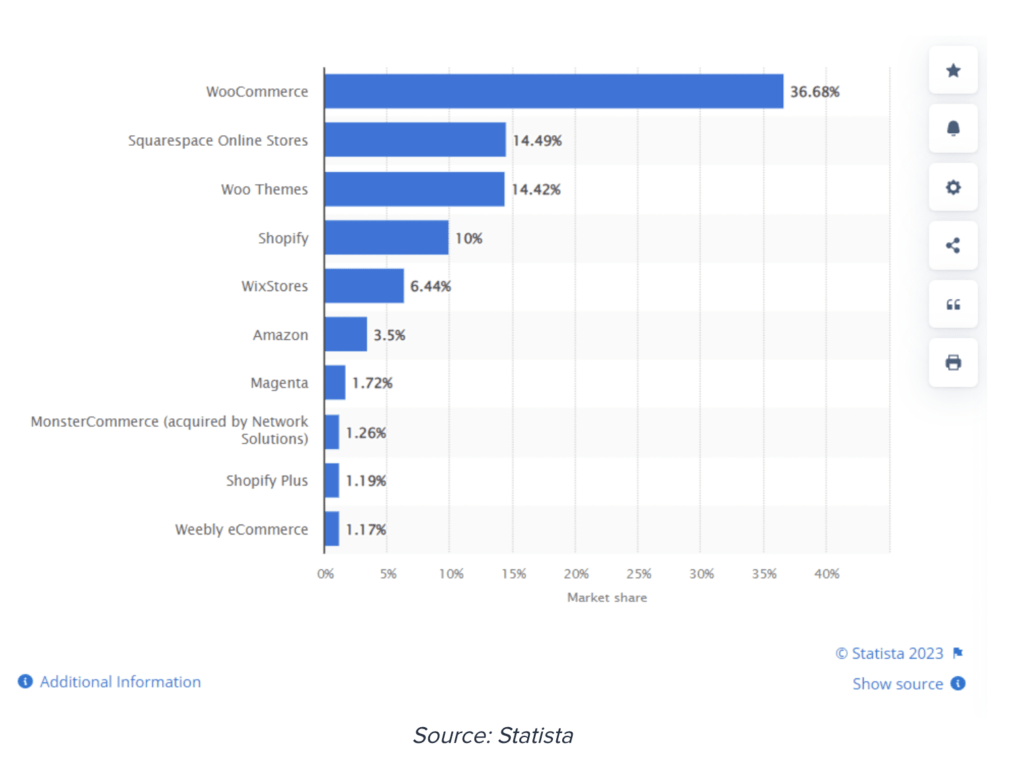Table of Contents
ToggleShopify vs Woocommerce
Let’s examine the advantages and disadvantages of Woocommerce and Shopify, and determine which one is more suitable for your small business.
First, we will delve into the features and offerings of both platforms.
What is Shopify?
Shopify is an all-in-one eCommerce solution that makes it easy for you to create an online store, accept payments, and manage your inventory, all from a single platform.
Shopify is one of the fastest-growing e-commerce platforms in the world and according to Cloudways Shopify currently holds 10% of the global e-commerce platform market share at the time of writing this article.
With Shopify, you don’t need to worry about the technical aspects of managing an eCommerce site, such as web hosting, security, caching, etc. Everything is already built-in and very easy to use. Making an ideal platform for those who want a hassle-free e-store experience.
What is Woocommerce?
WooCommerce is an open-source eCommerce plugin built for WordPress. It allows you to leverage the most powerful content management system (CMS) and use it to run an online store.
WordPress is the most popular website builder on the planet, powering 43% of all websites, and what many don’t know WooCommerce is the most popular eCommerce platform (yes, even more popular than Shopify). According to a report released by Cloudways Woocommerce currently holds 36.6% of the e-commerce platform market share at the time of releasing this article.
Because of the open-source nature of WooCommerce, you can customize every aspect of your store and easily add custom extensions.
Although woocommerce is the most popular platform it doesn’t necessarily make it better or the right choice for your business, so keep on reading to ensure which platform is right for you.

Is Woocommerce or Shopify Better for My Small Business?
When choosing between Woocommerce or Shopify for your small business, personal skills, budget, and preferences will determine which one is the best one for you.
Shopify for small business
In general, Shopify is much easier to use; it has a very simple and straightforward interface, leaving very little room for error. This simplicity is particularly beneficial for those seeking a hassle-free solution to manage their e-commerce website. With Shopify’s straightforward design, there is no significant learning curve, allowing users to quickly set up and run their own store within a few days.
On the flip side, while it may be simple to use, there are limitations to consider. You won’t have complete control over your website, design options and customizations are limited. Additionally, adding extra features like marketing, lead gen and support usually comes with a hefty price tag. This can be especially risky for small businesses or individuals starting out, as they may end up spending a significant amount of money before they even make a dime. Thus, becoming a substantial financial risk.
Woocommerce for small business
Woocommerce, on the other hand, provides complete control of your online store and costs much less, especially if you use a cheaper hosting company. Due to the fact it is part of WordPress it gives you almost unlimited customisation capabilities and the ability to integrate it with almost anything at very little cost.
With that said, it can take a bit of time and energy to learn how to use this platform effectively, and you must frequently update the software and monitor everything is working correctly, which can be cumbersome for those with little technical skills and no time to maintain the software.
How Do I Know Which Service Will Be Best for Me?
As discussed, your skills and preferences will determine whether you should go with Woocommerce or Shopify.
If you have a limited budget and are willing to do some hands-on work and navigate the learning process, Woocommerce could be a suitable choice for you.
If you aim to integrate numerous apps with your online store and want to minimize expenses, Woocommerce can also be a viable option for you.
However, if you are looking for a more user-friendly and easy-to-use platform, Shopify is the obvious choice. It offers a smoother experience with a lower learning curve right out of the box. Additionally, if budget is not a major concern for you and you already have some income from your product sales, sticking with Shopify would be a great decision.

What Are the Pros of Woocommerce?
Since Woocommerce is part of WordPress it offers unlimited flexibility to customize your website. Whether you want a flashy and crazy design, or just the ability to easily integrate your website with a multitude of apps to improve functionality, with Woocommerce you have the freedom to do it without breaking the bank too!
And if you are familiar with WordPress, you will find it easier than some to navigate the interface.
Also, Woocommerce is 100% customizable, the sky is the limit. While other e-commerce platforms such as Shopify offer customization too, the options in Woocommerce are miles more, which makes it stand out from the crowd.
Another benefit of Woocommerce is having complete ownership of your e-store. Although not common, Shopify has been known to close people’s stores if it believes you are in breach of their terms or selling something you shouldn’t (illegal) or if you fail to comply with any new tax or payment merchant regulations. This should not be a worry for most common people and is unlikely to affect most. However, certainly, something to keep in mind if your business depends on it to exist.
With WooCommerce being an open-source platform, you have full ownership of your e-store and the freedom to do with it what you like, with less risk of anyone else interfering and shutting it down.
What Are the Disadvantages of Woocommerce?
Woocommerce has some disadvantages that should be considered. One of the main drawbacks is that it’s open source, leading to a multitude of businesses building integrations for it. However, Woocommerce doesn’t necessarily vet all these apps, which can result in compatibility issues with other apps on the platform. This can lead to clashes and potential breakdowns on your website.
For example, I’ve encountered clients who experienced checkout issues, products missing, and other mishaps due to recently added plugins.
If you lack technical skills or don’t have access to a web developer, it may be challenging for you to identify and resolve issues. However, the Woocommerce community is extensive, and there is a high probability that you can find a solution through YouTube tutorials or online articles.
Woocommerce also has a steep learning curve for those unfamiliar and it requires maintenance, which means it may take some time to learn how to use it effectively. It is also less intuitive compared to Shopify, which is maintained and supported by Shopify themselves.
As a user, you will be responsible for updating the software and ensuring its proper maintenance. While updating the software is as simple as clicking a button, it still adds another task to your list of things to take care of.
It is important to consider that being open-source and being part of WordPress, which powers 43% of the internet, makes it a frequent target for hackers and more prone to security breaches and vulnerabilities.
What Are the Pros of Shopify?
The fact that Shopify is so simple to use makes it very appealing to a range of small business owners. If you have never opened an online store before, Shopify will allow you to do so with the least amount of headaches and stress involved. You can also use one of their ready-made themes to create a professional-looking e-commerce store within minutes.
Another one of Shopify’s most substantial aspects is the plugins it offers. More than 1,200 Shopify apps help you automate a slew of tasks, leaving you more time and energy to focus on marketing, boosting sales, and other essential responsibilities.
And if you have any problems with your online store, this platform has a 24/7 support team that is second to none. This means you won’t be left to fend for yourself if anything goes wrong.
Shopify, being a private and closed-off company, is considered safer and less prone to breaches compared to its counterpart. Nevertheless, every online website and e-commerce store remains susceptible to breaches regardless.
What are the Disadvantages of Shopify?
If you are an experienced e-commerce entrepreneur or desire more functionality from your online store, you might find Woocommerce or another competitor to be the better option. Shopify does not offer as much customization and it can be very limited.
When it comes to design Shopify’s design limitations make it difficult to create a personalized site. Shopify offers a limited number of free templates for customization, and the premium options can be quite expensive, going well over $400. Moreover, there is a high chance that other Shopify users will have the same template/ website as you, because there are only around a hundred of them available. Thus, it may be more beneficial to hire a Shopify developer, such as WVQ Media, to personalize your website for you.
Another thing to consider is that although Shopify does have an impressive app store with over 1,200 apps currently. You must pay a hefty monthly subscription fee to use most of the Shopify apps. And, for your online store to have a chance of bringing you a profit, you will need to use these apps so that you don’t have to manage everything manually which will consume much of your time. These subscriptions can become costly especially if you need 4-5 apps minimum to run your store efficiently.
Shopify is expensive to run due to their monthly subscription fee of $25 minimum and their transaction fee of 2% per transaction. Additionally, if you use Stripe, PayPal, or other payment providers, you will have to pay their transaction fees as well. This can significantly impact margins, especially for smaller business owners.
What are the Costs?
Here we will explore the cost impact of both of these.
Is Shopify or Woocommerce More Expensive?
When comparing the costs of Shopify and WooCommerce, it’s important to consider various factors. Here are some key points to help you understand which platform might be more expensive for your business:
1. Pricing Structure:
Shopify: It offers different pricing plans starting from $29 per month (Basic) up to $299 per month (Advanced). Additional transaction fees may apply if you don’t use their payment gateway.
WooCommerce: The core plugin is free, WordPress is also free but there are other associated costs such as your domain name which on average cost about $10 p/year, hosting which you can secure for as little as $2.00 a month and up to $100 if you are mega big, in which case I don’t think you would be concerned about this cost as much.
2. Transaction Fees:
Shopify: Shopify Payments will charge you an additional transaction fee ranging from 0.5% to 2% regardless if you use other payment gateways or not. This will vary depending on your plan. In addition to this, you will also pay the payment providers fees such as Stripe or Paypal which can range between 1.5%/2.5% on top of Shopify’s transaction fees.
WooCommerce: There aren’t any built-in transaction fees imposed by the platform itself; however, external payment gateways may charge their own processing fees such as Stripe and PayPal which can begin at around 1.5% to 2% and upwards.
3. Plugins & Themes
Shopify: Due to the fact that developers have to pay a fee to be listed on the Shopify app store, they will pass that cost onto you. Additionally, some assume that if you can afford Shopify, then you can also afford apps and therefore charge a premium on a monthly basis. As a result, Shopify’s apps are often more expensive than WooCommerce by quite a margin, making it a costly option for small businesses. Furthermore, themes on Shopify tend to be pricier as well with average prices ranging between $300 and $400.
Woocommerce: Woocommerce since it is part of WordPress, there is a vast library of plugins available. You can often find many free plugins that fulfill most of your e-commerce needs. Additionally, most extensions are reasonably priced with some as low as $4 per month. The WordPress community also offers lifetime deals where you only pay for the plugin once, making Woocommerce a more cost-effective option in the long run.
Is Woocommerce or Shopify More Beginner-Friendly?
Shopify is the clear winner when it comes to user-friendliness. Many beginners can learn how to use Woocommerce, but it will still take time and effort that could otherwise be invested in running the business.
The Shopify business model provides entrepreneurs with an accessible platform for selling online products, regardless of experience. It doesn’t offer as much customization as Woocommerce, but the features it does offer are of high quality.
Is Shopify or Woocommerce better for design?
The choice between Shopify or WooCommerce depends on what you are selling and your design preferences. For example, say If you are an artist selling digital prints or graphics and want a website with a more extravagant design choice and artistic feel, then Woocommerce would be a better option for you. With WordPress as its foundation, Woocommerce allows for full customization capabilities over your website.
On the other hand, if you are selling physical products like cosmetics, furniture, and electronics, it is important to have a beautifully designed website while keeping in mind ease of use for customers. The goal should be to ensure they can find products easily with all the necessary information available. This will enhance their purchasing experience leading to higher conversion rates and ultimately boosting your bottom line. Therefore for this type of product, either platform would suit.
So, if you are seeking a website with extravagant designs featuring animation and funky graphics, WooCommerce would be the better option. However, if you are satisfied with a beautiful and simple design, Shopify still offers plenty of customization options to achieve that look too.
But beware, why opt for a theme your nearest competitor might use once they’ve seen your website or why risk buying one that hasn’t been optimised for SEO, is bloated, and is aimed at various markets? Why not opt for a more bespoke theme? We’re a trusted WooCommere agency and a team of Shopify web design experts who’ll create you a custom theme on either platform. Get something unique for your brand.
How Do Shopify and Woocommerce compare on inventory management?
WooCommerce and Shopify offer efficient inventory management features, including product tracking, stock alerts, report generation, and bulk product uploading through CSV files.
While both platforms help manage product inventory, there is a notable difference in their handling of product variations. Product variations refer to the attributes that can be applied to a particular product, such as size or colour. WooCommerce provides greater flexibility, allowing an unlimited number of product variations, whereas Shopify has a limit of 100 variants and three options per product. To exceed this limit on Shopify, third-party apps must be used, which adds another monthly or annual cost for running an eCommerce store on the platform.
A study by Ecommerce Platforms found that WooCommerce sites have an average conversion rate of 1.66%, while Shopify sites have an average conversion rate of 1.52%.
Source: Ecommerce Platforms
WooCommerce and Shopify are reliable eCommerce solutions, but businesses requiring extensive product variations or a bespoke set-up should consider using WooCommerce. Contact us about your future goals for an eCommerce store, and we’ll advise you on which platform you should choose
WooCommerce vs Shopify: Shipping And Dropshipping
For those who sell physical products, Shopify and WooCommerce provide a seamless shipping experience for merchants. You’ll be able to ship products internationally, and if you choose Shopify, you’ll benefit from its integrated partnerships with major carriers such as Canada Post, FedEx, UPS, DHL, and USPS.
Both eCommerce platforms can also be utilised for dropshipping, a retail model that involves not holding any products in inventory. Instead, items are purchased from vendors and shipped directly to customers. When creating a dropshipping business, your website will resemble a typical online store.
Shopify offers dedicated applications for the most popular marketplaces, such as Aliexpress Dropshipping. At the same time, the WooCommerce community has developed numerous plugins that allow for the direct importation of products from third-party marketplaces. The AliDropship plugin, which integrates with AliExpress and enables one-click order fulfillment, is among them.
If you want to launch a dropshipping business model, WooCommerce and Shopify are excellent choices. However, it’s important to remember that many of these product marketplaces have membership fees, shipping expenses, and other costs, which may reduce your already slim dropshipping profits.

WooCommerce vs Shopify: SEO Capabilities
When it comes to SEO capabilities, both WooCommerce and Shopify offer their own strengths and features to help your online store rank higher in search engine results.
WooCommerce, being a WordPress plugin, gives you the advantage of leveraging the powerful SEO capabilities of the WordPress platform. WordPress is known for its SEO-friendly structure and extensive plugin options. With WooCommerce, you can use popular WordPress plugins like Yoast SEO or All in One SEO to optimise your store’s content and meta tags. You also have more control over technical SEO aspects such as server settings and URL structure, allowing you to fine-tune your store’s SEO performance.
Being a fully hosted platform, Shopify takes care of many SEO aspects for you. It includes built-in SEO features such as customisable title tags, meta descriptions, and URLs, allowing you to optimise your store’s pages for search engines. Shopify also automatically generates sitemaps, making it easier for search engines to crawl and index your website. Additionally, the platform provides fast and reliable hosting, which can contribute to better website speed and performance, a crucial factor for SEO.
Despite the fact that WooCommerce offers a broader selection of plugins, the Shopify App Store has some beneficial SEO plugins, and Yoast has dipped its toes in the Shopify App market with a similar plugin for Shopify. However, you’ll have to pay a monthly subscription for this, unlike the free WordPress version and, on top of a Shopify plan.
Both WooCommerce and Shopify offer solid SEO capabilities. If you prefer a fully hosted platform with built-in SEO features, Shopify’s hosting and SEO functionalities are a great choice. However, if you value the flexibility and customisation options that come with WordPress and its extensive plugin options, WooCommerce allows you to maximise your store’s SEO potential.
WooCommerce vs Shopify: Which Platform Wins?
Now that we have explored the various aspects of WooCommerce and Shopify, it’s time to decide which platform is best for your online store. Both platforms have their unique features and benefits, so it ultimately depends on your specific needs and preferences.
Shopify: If you value simplicity and convenience, Shopify’s fully hosted solution might be the right choice. With Shopify hosting, you don’t have to worry about the technical aspects of managing a store. Everything is taken care of for you, allowing you to focus on selling your products. The user-friendly interface and pre-designed templates (if you’ve taken this route) make it easy to set up and manage your store, even if you don’t have much technical expertise.
WooCommerce: On the other hand, if you prioritize flexibility, customization, and keeping costs down, WooCommerce might be the better fit. With WooCommerce, you have complete control over your hosting and can customize every aspect of your store’s design and functionality. The wide range of free themes and custom themes, plugins, and extensions give you the tools to create a unique and personalized online shopping experience for your customers.
Ultimately, the best platform for your online store will depend on your specific requirements, budget, and technical expertise or resources. Take the time to consider all the factors we’ve discussed in this blog post, and choose the platform that aligns with your vision and goals for your online business. Whether you choose Shopify or WooCommerce, both platforms offer the features and capabilities to help your online store succeed.
Still can’t make a decision? Then book a call with one of our experts, and we’ll help you make the right choice.



